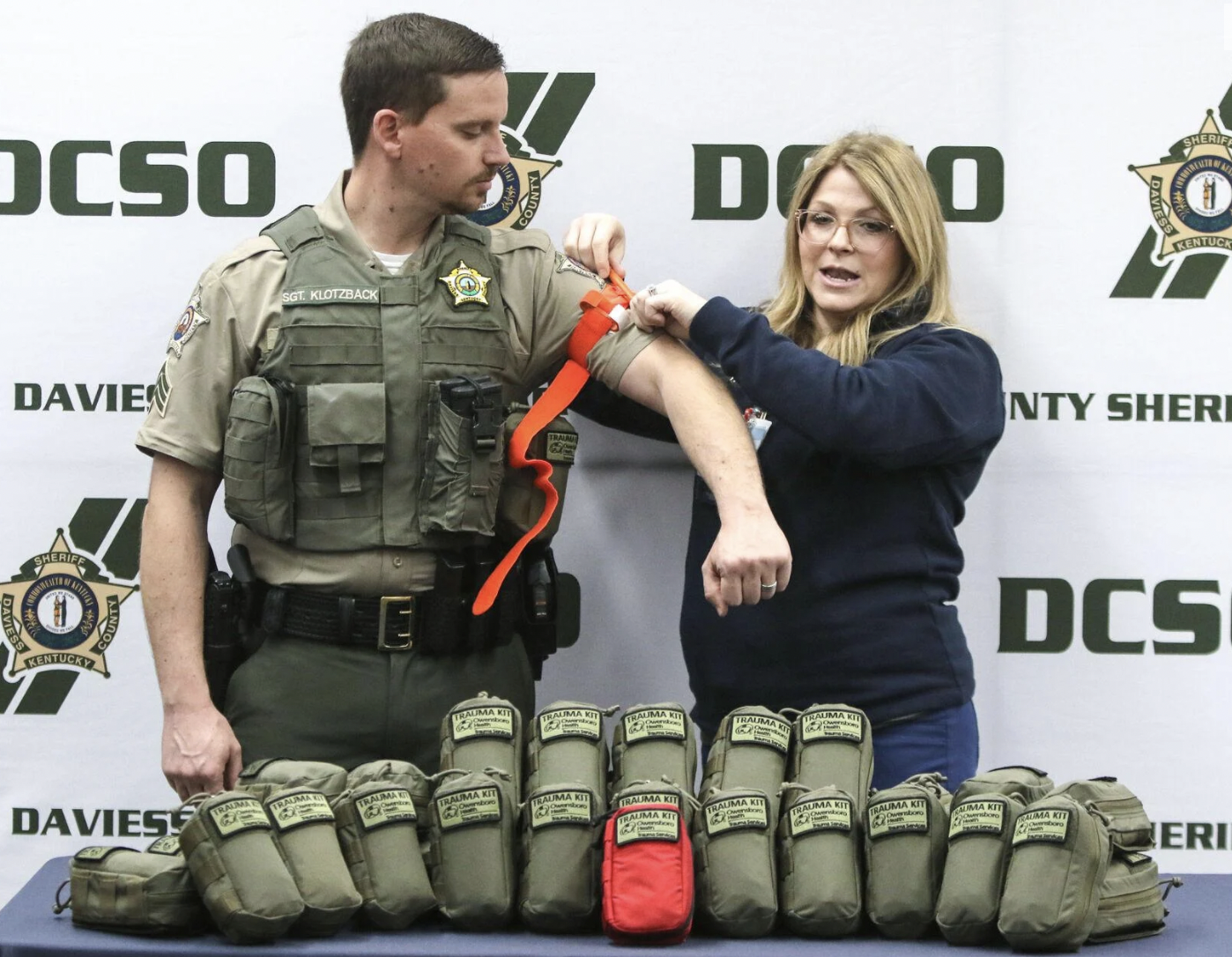Published on January 10, 2024
OH Donates Trauma Kits to Sheriff's Office

By James Mayse, Messenger-Inquirer
Daviess County sheriff’s deputies responding to traumatic injuries can be on their own for several minutes before additional help arrives. In the case of a person suffering from a traumatic injury and hemorrhaging, there’s not much time to take action.
“The number one preventable cause of death after trauma is hemorrhage,” said Hannah Blanton, patient educator for Owensboro Health.
Tuesday morning, Owensboro Health officials came to the Daviess County Courthouse to donate 42 individual first aid kits, which contain tools to stop bleeding from serious injuries, to sheriff’s deputies.
At about $50 each, the kits cost $2,100, with the funds coming from the hospital system’s Trauma Services budget. The kits include a tourniquet, a chest seal, wound packing and compression bandages.
The hospital is also providing training on how to use the kits to deputies, and will update the training annually and replace used kits.
Daviess County Sheriff Brad Youngman said the donation stemmed from a partnership between the hospital system and sheriff’s office. The individual kits are small and will be worn on deputies’ duty vests.
“If you’re on a scene and someone is bleeding out, you don’t have time to run back to your car,” and get a first aid kit, Youngman said. In the county, an ambulance could be about 15 minutes away from a scene, Youngman said.
“We don’t simply stand by, radio for an ambulance and wait,” Youngman said.
Dr. P. Tony Decker, OH medical director for Trauma Services, said about 150,000 people died of traumatic injuries in the United States last year.
“That’s one 9-11 event every week,” Decker said.
The tourniquets, chest seals and other materials are designed to a deputy can tend to their own wounds if they suffer a serious injury on duty.
“Our first responders within our community are a critical part of keeping our community safe,” Blanton said. “If they aren’t safe, they can’t do their jobs.”
Deputies will be trained on how to administer the tourniquets and chest seals next week, and will receive followup training through Owensboro Health. The training is funded by Stop The Bleed, a program through the American College of Surgeons.
When kits are used and deemed in need of replacement, Owensboro Health will provide new equipment, Blanton said. The hospital also provides the training to community groups and the public, Blanton said.
“’Stop The Bleed’ is not just for first responders and hospital employees,” Blanton said. “’Stop The Bleed’ is actually intended for civilians.”
Owensboro Health president and CEO Mark Marsh said for people between the ages of 2 years old and their upper
40s, trauma is the leading cause of death.
“We believe there are about 2,000 trauma injuries we treat” annually throughout the hospital system, Marsh said. Marsh said the kits will help prevent trauma deaths, and that the hospital system is always interested is similar partnerships, like the one with the sheriff’s office.
“This is a great (example) to our community in what a partnership can do,” Marsh said.
About Owensboro Health
Owensboro Health is a nonprofit health system with a mission to heal the sick and to improve the health of the communities it serves in Kentucky and Indiana. The system includes Owensboro Health Regional Hospital, nationally recognized for design, architecture and engineering; Owensboro Health Muhlenberg Community Hospital; Owensboro Health Twin Lakes Medical Center; the Owensboro Health Medical Group comprised of over 350 providers at more than 30 locations; four outpatient Healthplex facilities, a certified medical fitness facility, the Healthpark; a weight management program, and the Mitchell Memorial Cancer Center.
On average each year, we have more than 19,000 inpatient admissions, deliver 2,000 babies and provide the region’s only Level III NICU. Owensboro Health physicians perform nearly 33,000 surgical procedures, including nearly 150 open-heart surgeries. Our physicians and staff have 90,000 Emergency Department visits and more than 1.25 million outpatient visits annually. Visit our home page for more information.